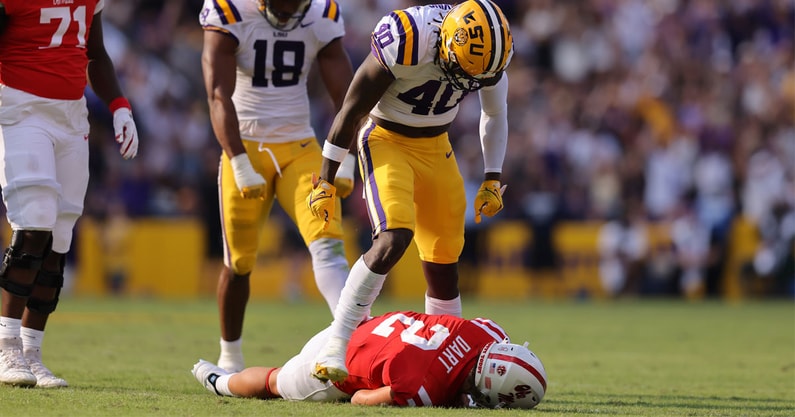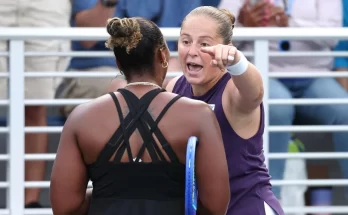Brian Kelly Breaks Silence on Harold Perkins’ Return to LSU and His Surprising New Position
When LSU head coach Brian Kelly recently opened up about Harold Perkins’ unexpected decision to return to Baton Rouge and the intriguing new role he’s set to play, it sent ripples through college football circles. Perkins, a standout defensive star and one of the most talked-about players in the nation, had many wondering what influenced his choice to come back, especially with a potential position switch that could redefine his career trajectory. Kelly’s candid revelations shed light on both the mindset behind Perkins’ return and the strategic vision LSU has for their star defender.
Perkins’ journey has been one of relentless determination and evolving potential. Having already established himself as a formidable force on the defense, his return signals not just loyalty but also a commitment to growth and team success. Brian Kelly, known for his clear communication and strategic acumen, made it clear that Perkins’ decision was not made lightly. The conversations between player and coach emphasized mutual respect and a shared ambition to elevate LSU football to new heights.
One of the most surprising elements of Perkins’ comeback is the position Brian Kelly revealed he will be playing. While Perkins has traditionally shined as an outside linebacker and pass rusher, the coaching staff envisions him taking on a hybrid role that blends linebacker instincts with defensive end responsibilities. This shift isn’t just about filling gaps but maximizing Perkins’ unique athleticism and versatility, allowing him to pressure quarterbacks, defend against the run, and disrupt offensive schemes in ways opponents might not anticipate.
Kelly highlighted that this position change is designed to leverage Perkins’ speed, strength, and football IQ. By moving him closer to the line of scrimmage and integrating him into various defensive looks, LSU aims to create matchup nightmares for opposing offenses. This approach aligns perfectly with the aggressive defensive philosophy Kelly is cultivating, one that prioritizes adaptability and relentless pressure.
Another factor that played into Perkins’ decision to stay was the broader vision Kelly laid out for the team’s future. The coach emphasized the importance of continuity, leadership, and building on the foundation that previous seasons had established. Perkins’ role as a leader both on and off the field was a central theme in these discussions. His presence as a vocal, influential figure is invaluable for fostering the kind of culture that breeds success at LSU.
Kelly also noted that the development of younger players and the integration of new recruits were key elements in convincing Perkins that returning was the right move. The opportunity to mentor rising talent and help LSU compete at the highest level was something Perkins embraced wholeheartedly. This willingness to invest in the team’s collective future speaks volumes about his character and priorities.
From a tactical standpoint, the position switch also gives LSU flexibility in defensive formations. Having Perkins in a hybrid role allows the Tigers to disguise blitzes, rotate defenders more effectively, and adjust on the fly against dynamic offenses. Kelly pointed out that this versatility is critical in today’s game, where adaptability often determines success against high-powered attacks.
The decision has sparked excitement among fans and analysts alike. Many see Perkins’ return and new position as a game-changer that could elevate LSU’s defense to elite status. The combination of Perkins’ raw talent, Kelly’s strategic planning, and the overall team chemistry positions LSU as a formidable contender moving forward.
Kelly’s openness in discussing Perkins’ situation also reflects a broader trend in college football — the increasing importance of player-coach relationships and the emphasis on personal development alongside athletic achievement. This human element, combined with strategic ingenuity, often separates good programs from great ones.
Ultimately, Brian Kelly’s revelation about Harold Perkins’ return and position change is more than just a personnel update. It’s a statement of intent, signaling LSU’s determination to compete fiercely and creatively in a challenging college football landscape. Perkins embodies the qualities of resilience, leadership, and adaptability that Kelly values, making him a cornerstone of the Tigers’ plans.
As the season approaches, all eyes will be on Perkins to see how this new role unfolds on the field. His performance will not only impact LSU’s defensive prowess but also influence recruiting, fan engagement, and the overall narrative of LSU football. With Brian Kelly’s confidence and Perkins’ commitment, the Tigers are poised for an exciting and impactful chapter.



